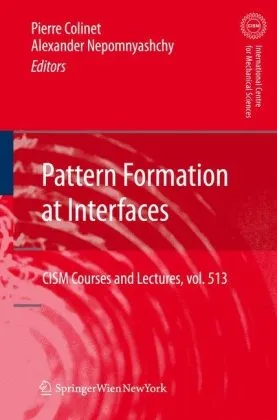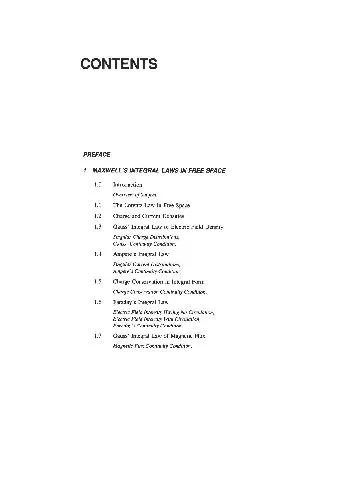Pattern Formation at Interfaces (CISM International Centre for Mechanical Sciences)
4.0
بر اساس نظر کاربران

شما میتونید سوالاتتون در باره کتاب رو از هوش مصنوعیش بعد از ورود بپرسید
هر دانلود یا پرسش از هوش مصنوعی 2 امتیاز لازم دارد، برای بدست آوردن امتیاز رایگان، به صفحه ی راهنمای امتیازات سر بزنید و یک سری کار ارزشمند انجام بدینکتاب های مرتبط:
معرفی کتاب "Pattern Formation at Interfaces"
کتاب "Pattern Formation at Interfaces" یکی از منابع علمی شاخص و تخصصی است که در مورد پدیدههای شکلگیری الگو در سیستمهای مختلف تمرکز دارد. این اثر، انتشار یافته تحت مجموعه معتبر CISM International Centre for Mechanical Sciences، دانشجویان، پژوهشگران و علاقهمندان به زمینههای علمی مهندسی مکانیک، فیزیک، ریاضی کاربردی و علوم مواد را هدف قرار داده است.
خلاصهای جامع از کتاب
این کتاب به بررسی عمیق فرآیندهای فیزیک و ریاضیاتی میپردازد که منجر به شکلگیری الگوها در واسطها (Interfaces) میشوند. از جمله موضوعات مطرح در آن میتوان به instabilities، nonlinear dynamics، و تعاملات پیچیده بین نیروهای مختلف در سیستمهای چندفازی اشاره کرد. فرآیندهایی نظیر رشد کریستالی، تغییرات حرارتی، و پدیدههای مرتبط با سیالات نیز در این کتاب با جزئیات کامل تحلیل شدهاند. در این کتاب به استفاده از روشهای تحلیلی و عددی جهت مدلسازی و پیشبینی شکلگیری الگوها تاکید شده است.
در فصلهای مختلف این اثر، از مدلهای فیزیکی مفید نظیر Hele-Shaw flows، پدیدههای مرتبط با مرزهای فازی، و میکروساختارهای چندلایهای استفاده شده که هر یک جذابیت و کاربرد خاص خود را در مهندسی و صنعت ارائه میدهند.
نکات کلیدی
- تاکید بر درک فرآیندهای پیچیده با استفاده از nonlinear analysis.
- کاربردی بودن در زمینههای علمی نظیر علم مواد، دینامیک سیالات و مدلسازی رشد کریستالی.
- ارائه ترکیبی از مثالهای تحلیلی و عددی برای درک بهتر مفاهیم.
- توسعه ابزارهای علمی که برای تحلیل سیستمهای چندفازی ضروری هستند.
نقلقولهای برجسته از کتاب
"The beauty of nature lies not just in its simplicity, but in the complexity of patterns it weaves."
"Understanding instabilities is key to mastering the dynamics of interfaces."
چرا این کتاب اهمیت دارد؟
این کتاب نقشی اساسی در تکامل و پیشرفت درک ما از پدیدههای فیزیکی ایفا میکند. توانایی مطالعه الگوهای پیچیدهای که توسط نیروها و ناپایداریهای گوناگون در سیستمهای چندفازی ایجاد میشوند، پیامدهای قابل توجهی در علوم و مهندسی داشته و کاربردهای صنعتی بسیاری را امکانپذیر میسازد. از طراحی مواد هوشمند گرفته تا بهبود فرآیندهای تولید، این کتاب یک منبع بیمانند برای متخصصان این حوزه است.
خواندن این کتاب به تمامی کسانی که علاقهمند به تقویت دانش فیزیکی و ریاضی خود در زمینه شکلگیری الگوها هستند توصیه شده و میتواند چراغ راهی برای پژوهشهای بیشتر باشد.
Introduction
Welcome to Pattern Formation at Interfaces, part of the esteemed CISM International Centre for Mechanical Sciences series, authored by Pierre Colinet and Alexander Nepomnyashchy. This book delves into the fascinating world of interface phenomena where science and engineering converge to unravel complex patterns formed under dynamic processes. It offers a rigorous exploration into the key physical mechanisms, mathematical frameworks, and experimental studies that contribute to our understanding of pattern formation at interfaces. With its interdisciplinary approach, this book serves as a valuable resource for researchers, engineers, and academicians.
The study of interfaces is critical in many scientific and industrial applications. From the intricate interplay of liquid films to the emergence of wave structures in multilayer systems, the behaviors at these interfaces often define the functionality and efficiency of advanced technologies. This book not only elucidates the fundamental concepts but also provides comprehensive analyses that reflect both theoretical and empirical insights into this field.
Detailed Summary of the Book
Pattern Formation at Interfaces is a comprehensive exploration of phenomena occurring at material interfaces. It begins by addressing the fundamental principles of interface mechanics, including instabilities caused by thermal, mechanical, and chemical stimuli. The authors carefully introduce the mathematical tools needed, focusing on nonlinear system dynamics, stability analysis, and numerical modeling techniques that underpin the patterns observed at interfaces.
The book is divided into several sections, each targeting a specific type of interface phenomenon. Topics include Marangoni effects, thin liquid films, pattern formation in multilayer systems, as well as experimental methods for examining interfaces. By combining theory, mathematical modeling, and experimental results, the authors create a holistic framework that demonstrates the physical significance of these patterns.
The final chapters delve into applications of interface studies in fields such as materials science, bioengineering, and nanotechnology. This practical approach highlights the book's relevance to solving real-world problems, making it a bridge between theoretical knowledge and industrial applications.
Key Takeaways
- Deep understanding of physical principles governing interfaces and instabilities.
- Mathematical modeling techniques, including nonlinear system dynamics and PDEs.
- Detailed exploration of experimental approaches to study interfaces and validate theories.
- Comprehensive coverage of applications in modern technologies, from bioengineering to nanomaterials.
- Interdisciplinary approach bridging physics, chemistry, and engineering.
Readers will come away with the ability to analyze interface phenomena critically, applying both theoretical models and experimental techniques to a diverse range of problems encountered in academic and industrial settings.
Famous Quotes from the Book
"The behavior of an interface is often governed not by the individual materials it separates, but by the dynamic interactions that transcend their boundaries."
"Patterns are the fingerprints of physics manifesting its elegance at every interface."
Why This Book Matters
Pattern Formation at Interfaces stands as a cornerstone of scientific literature in the study of material interfaces. Its interdisciplinary scope bridges numerous fields—from physics and mechanical sciences to biology and engineering—making it an invaluable resource for exploring the complex interactions that govern material behaviors. Whether you're a seasoned researcher or an aspiring student, this book will enrich your understanding of interfaces and empower you to apply this knowledge to diverse scientific and technological challenges.
Furthermore, the book’s methodology—effectively balancing theoretical analysis, mathematical rigor, and experimental validation—offers readers a unique perspective that is both deep and practical. It addresses questions that lie at the heart of understanding natural and industrial processes, creating a foundation for innovation across multiple domains.
Conclusion
Pattern Formation at Interfaces is a definitive guide to the study of dynamic phenomena at material interfaces. With its interdisciplinary focus, robust theoretical foundation, and emphasis on real-world applications, the book provides essential knowledge to researchers, engineers, and students alike. It is a testament to the beauty of physics and mathematics as they interact with complex systems, and it will inspire readers to delve deeper into the science of interfaces.
دانلود رایگان مستقیم
شما میتونید سوالاتتون در باره کتاب رو از هوش مصنوعیش بعد از ورود بپرسید
دسترسی به کتابها از طریق پلتفرمهای قانونی و کتابخانههای عمومی نه تنها از حقوق نویسندگان و ناشران حمایت میکند، بلکه به پایداری فرهنگ کتابخوانی نیز کمک میرساند. پیش از دانلود، لحظهای به بررسی این گزینهها فکر کنید.
این کتاب رو در پلتفرم های دیگه ببینید
WorldCat به شما کمک میکنه تا کتاب ها رو در کتابخانه های سراسر دنیا پیدا کنید
امتیازها، نظرات تخصصی و صحبت ها درباره کتاب را در Goodreads ببینید
کتابهای کمیاب یا دست دوم را در AbeBooks پیدا کنید و بخرید
1332
بازدید4.0
امتیاز0
نظر98%
رضایتنظرات:
4.0
بر اساس 0 نظر کاربران
Questions & Answers
Ask questions about this book or help others by answering
No questions yet. Be the first to ask!












![Electricity and Magnetism. Chapters from Concepts of Physics [Chapters 31-41]](https://s3.refhub.ir/images/thumb/Electricity_and_Magnetism__Chapters_from_Conc_43012.webp)
